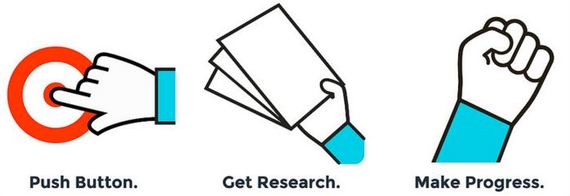Paywalls stop research ideas dead in their tracks. These obstructions, while counterproductive to the digital, crowd-accelerated innovation world we inhabit, have a distinct purpose: corporate profit margins. For-profit academic publishers in 2015 accumulated $25.2 billion in profit. While this opulence helps to uncork many bottles of champagne for publisher board members looking for solid return on investment, that profit margin does less for society looking to solve complex problems with access to cutting edge information.
Students David Carroll and Joe McArthur, along with a handful of colleagues, recently pushed the open data movement forward with their release of an open access directed app called the Open Data Button. This new button helps users work around paywalls in order to gain access to research data that isn't readily available online. The Open Data Button, and the data generated through the service, allows reproducibility to take a front and center conversation in academic and scientific circles.
If all goes as planned, with the click of the button, researchers will be able to reveal the lack of access to a particular data set not only to their peers, but to the entire open access community. McArthur says that he and his colleagues take the brunt of the work in order to uncover access to the locked data. McArthur says that his team knows of unique repositories that the average user may not be aware of and, if necessary, will even reach out to researchers and scholars to uncover the data on their own. Once the sought data set is located, all of the researchers that identified the blockage of access will be notified and delivered the desired data.
"This app really grew out of the frustration that my co-founder and I had as students not being able to access information," says McArthur. "We were trying to do cutting edge research and really make a difference, but we couldn't access the basic things we needed."
McArthur's research dilemma is not an uncommon problem. Brian Nosek, a professor at the University of Virginia, saw first-hand similar problems associated with paywalls and non-access. Nosek says, "I was in Serbia giving a talk at the University of Belgrade to people in the psychology department, which is my area of research. I noticed most of the graduate students were doing research in the topic that I study: implicit cognition. I was like, 'Oh, wow. How is it that so many people are studying this particular area?' as I was talking to all the graduate students. And they said, It's because we can access the papers. This sub-area of research has the practice that all the researchers put their papers online so we can get them -- so we can be up with the literature and data. That is why we study this area."
Academic, scientific and philanthropic communities understand the importance of open access to information and data. Stories like Nosek's clearly show how paywalls stifle academic choice and research progression. The Open Data Button is one move toward a more open and inclusive research environment -- and that effort deserves our merit.
